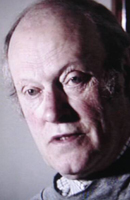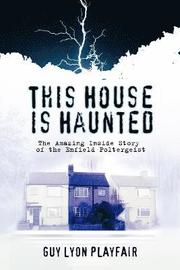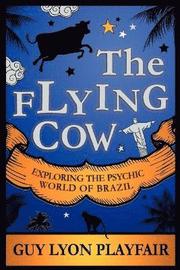

I was born in India, brought up in England, and emigrated to Brazil after a couple of years working for a property developer, which I felt was not where I really wanted to be. I spent fourteen years there mostly working as a freelance journalist, with a four-year period in the press section of the U.S. Agency for International Development, which was a great learning experience.
2-Why did you get interested in parapsychology and psychic phenomena?
My mother was a member of the Society for Psychical Research, so I grew up reading the SPR Journal along with my comics and jazz magazines, and was aware of the subject since I was about ten or so and accepted it as part of life.
3-Have you had any personal, first-hand experience with some actual paranormal or afterlife phenomenon?
Yes indeed, several. I've described most of them in my various books. My Brazilian experiences are in my first book The Flying Cow, which has just been updated and reissued, as has This House is Haunted, which is all about the Enfield poltergeist case of 1977-78. And all kinds of odd things happened when I was working with Uri Geller as I described in The Geller Effect.
4-What is your opinion of Allan Kardec and the movement based upon his teachings?
Very favourable. I was very lucky to meet Hernani Guimarães Andrade, the pioneer of psychical research in Brazil, who let me work with the institute he founded. He was a Spiritist as well as a trained scientist, and a first rate field researcher who did a great job recording the cases that he investigated, notably of poltergeists and cases of the reincarnation type. He taught me everything I know about psi research and I am eternally grateful to him for that. I'm not a card-carrying Spiritist but a very sympathetic observer greatly impressed by the charitable work Brazilian Spiritists do.
5-You have written an excellent book about Chico Xavier, who was the most famous and respected medium in Brazil. However, some Brazilian psi researchers like Vitor Moura Visoni have recently argued that Xavier was a fraud on the grounds that 1)Xavier never accepted scientific controls; 2)His guide never actually existed (according to the findings of Brazilian researcher José Carlos Ferreira Fernandes); 3)There is much evidence of cold reading; and more importantly 4)Xavier's books have passages copied of others famous books. What do you think of these criticisms?
Not very much. It is generally known that 'spirit guides' are not identifiable real people, and anybody who knows anything about mediumship will know that a trance medium has no conscious control over what comes through. As for Chico being a 'fraud', all I can say is that since he donated 100% of his royalties for something like 450 books to charitable causes, we need a few more 'frauds' like him.
6-According to your research, and leaving aside cases of tricks, is there good evidence to think that "psychic surgery" is an actual paranormal phenomenon?
Undeniably, by definition. 'Paranormal' merely means inexplicable in terms of presently understood science, and there is abundant evidence that 'psychic surgeons' have been seen to do things that await explanation. I collected a good deal of evidence from witnesses and had a couple of operations myself, so have no doubts that we have a genuine mystery here. There are many frauds, especially in the Philippines, but their tricks are quite easy to spot.
7-What do you think of psychic surgeon Zé Arigó? Was he a real psychic surgeon?
Well, the president of Brazil (Kubitschek) evidently thought so, since he pardoned him after he had been jailed for illegal practice of medicine. So did Andrija Puharich, a qualified doctor who spent a lot of time with him as you can read in John G. Fuller's excellent book Arigo: Surgeon of the Rusty Knife. I include some interesting eye-witness testimony from doctors who had seen him in action in The Flying Cow.
8-Uri Geller is a controversial figure among psychics. Skeptics consider him as the paradigm of "psychic fraud" and among psi researchers the opinion seems to be divided. According to your research, is Geller an actual psychic? Does he posses actual paranormal skills?
I've been in touch with Uri since 1973 and first met him when he came to live in England in 1985. We are still in regular touch and I consider him a good friend. I think I know him better than any of his detractors do, and think he has been much misunderstood. A lot of the opposition to him is just based on jealousy. As for his skills, I'm still waiting for a normal explanation of how he managed to bend a chrome vanadium spanner (which I still have) as I described in Fortean Times (issue 250, 2009). His critics have gone all quiet about that.
9-It has been said that Geller had contact with alien beings. What is your opinion about this aspect of Geller's life?
I have questioned him about this and his reply is that it all happened (if it did) while he was hypnotised by Puharich and he doesn't have any conscious memories of this stuff.
10-What is your opinion about William Crookes' research with Florence Cook? Do you think the evidence supports the hypothesis that Cook was a fraud?
I don't really have anything to add to the volumes that have already been written about this. She was certainly caught faking, like Otilia Diogo in Brazil, but that is no proof that she was always a faker.
11-In alternative medicine exists the so-called "energetic medicines", or therapies which use "paranormal energies" (chi, prana, ki, etc) in order to produce healings. Have you researched these kinds of alternative therapies. Do they use actual paranormal energies which work independently of the placebo effect or suggestion?
This is not something I am qualified to comment on. I regularly use alternative therapies, especially herbal, and have found them often better than chemicals. I am especially interested in hypnosis, which I think should be used far more often that it is these days. In my book If This Be Magic (also recently reissued) I give many examples of what it can do when used properly.
I also had experience of non-medical healing when I had a slipped disc which made me unable to write with my right hand. I tried numerous therapies without success, and a single session with Matthew Manning produced an immediate cure. An orthopedic surgeon who was a friend of mine told me it would take two years for the ulnar nerve to recover, and after examining me before and after my session with Matthew said he had no medical explanation.
12-In Brazil and other countries, one hears stories of voodoo, black magic and similar methods of provoking spiritual or physical damage in others at a distance through paranormal means. Do you think something paranormal is operating in these cases? Is there some evidence supporting the paranormal effectiveness of these methods of "damaging at a distance"?
I've written about this in The Flying Cow. We found evidence for black magic practices on several of the poltergeist cases that Hernani's institute researched. Yet I have never come across any such evidence on any of the British cases I have investigated.
13-Do you think that, overall, the case for survival of consciousness is convincing? According to your studies, do you think the evidence for reincarnation is good?
These are different questions and it's important to distinguish between them. Survival of consciousness I consider proved beyond any reasonable doubt. The word reincarnation implies the permanent return of a whole personality, and I don't think the evidence generally supports that, although there are cases where it does seem possible, when there are birthmarks and behaviour patterns as well as memories. I'm thinking of people like Jenny Cockell, Om Sety and most recently James Leininger in which identifiable people do seem to have returned to earth, but such cases are very rare. On the whole, though, I think that what people call reincarnation is more like temporary transfer of fragments of memory, etc.
There is still much to do in establishing just what 'reincarnates'. Luckily we have a huge database of cases thanks to those who recorded the evidence, from Gabriel Delanne (whose father was a colleague of Kardec) and Albert de Rochas to Ian Stevenson, Erlendur Haraldsson, Antonia Mills and Hernani Guimarães Andrade.
14-Professional skeptics argue that the evidence of neuroscience clearly shows an extremely close dependence of the mind on the brain. So the idea of "survival of consciousness" is, at best, highly implausible; and at worst, physically impossible. What do you think of this common skeptical argument?
It may be implausible, but the evidence suggests it does happen. We should always base our beliefs on evidence, not what we are told we ought to believe, especially by sceptics who haven't done their homework or scientists who think they have all the answers. It was considered implausible once for meteorites to fall from the sky or for continents to drift, but now both are accepted as quite normal. In 1894 Albert Michelson, a future Nobel laureate, was saying that 'the more important laws and facts of physical science have all been discovered', and 'the possibility of their ever being supplanted in consequence of new discoveries is exceedingly remote'. That was before Planck's quantum and Einstein's relativity theories, and the discovery of x-rays, radiation, sonar and radio among may other things that must have seemed implausible in 1894. Don't forget Arthur C. Clarke's Law: 'When a distinguished but elderly scientist says something is impossible, he is almost certainly wrong'.
15-Do you agree with the filter/transmission hypothesis defended by writers and researchers like William James, Frederic Myers and Chris Carter to explain the mind-body connection and account for the evidence for survival?
I agree with everything Myers and James wrote, and Carter has done an excellent job in clarifying the present situation - he is also one of the best critics of the professional sceptics.
16-What do you think of the Super-ESP or Super-Psi hypothesis? Do you consider it a viable alternative to the survival hypothesis?
No, at least not until it can either be proved or disproved. Hypotheses are of no use unless they lead to testable theories.
17-Let's talk about the so-called "organized skepticism". You have written about professional skeptics a lot and perhaps our readers would like to know which is your current opinion about professional skeptics and debunkers. Do you think their overall contribution to parapsychology has been constructive and positive?
Certainly not, with rare exceptions, notably the late Marcello Truzzi who was a good friend of mine. I've said all I have to say about the others on www.skepticalinvestigations.org
18-My blog is largely dedicated to refute organized skeptics' misdirections and fallacies, and mainly expose their philosophical foundations. Do you think it is a good strategy against organized skepticism to stress a constant critical examination of them (their books, articles, lectures, "researches", etc?
I think it is usually a waste of time. People who have made up their minds don't want to be confused by facts and evidence.
19-Which is the best strategy for parapsychologists in dealing with professional skeptics? Professional skeptics seem to have so much energy and time available to debunk parapsychology, afterlife research, ufology or spirituality. Which is the main motivation behind organized skepticism that could explain that behaviour?
There are certainly many things that deserve to be debunked, and I'm always ready to do some debunking myself, as in my article 'The return of Katharine Bates' (Journal of the SPR, July 2005) where I found a highly probable normal explanation for what was claimed to be a book of past-life recall. However, there is no justification for claiming, as many do, that anything still unexplained must be imaginary or fraudulent. That's just bad science. I really don't have much time for worrying about the professional sceptics.
20-Do you think that if a guy like D.D. Home would live at the present and were consistently tested by professional debunkers like Richard Wiseman, Susan Blackmore, Chris French or Ray Hyman, he could convince them that actual paranormal powers do exist?
Well, for a start he wouldn't be consistently tested by any of those except maybe Chris French who is a relatively moderate sceptic and a very well-informed one. It's interesting that Peter Lamont, a parapsychologist from Edinburgh who is also a fairly sceptical magician, wrote the best book to date on Home (The First Psychic) in which he could not find any convincing evidence that Home's abilities were other than genuine. He would be the right one to do the testing.
21-What do you think about other "fringe" topics, like UFOs and alien abductions? Do you think the evidence for the alien hypothesis (in order to account for some cases of UFOs and abduction experiences) is reasonably good or at least worthy of serious scholarly consideration?
I don't have any experience in this area, but any human experience deserves consideration. As it happens, I had a lunch date with John Mack for the day after he was tragically killed by a drunk driver in London. I would have asked him the same questions, and I am sure he would have said yes.
22-Do you believe in God? Do you think there is good scientific evidence for a transcendent creator/designer of the universe?
Ah, an easy question at last! I find it hard to imagine how such a vast thing as the universe just happened to come into being by chance. I accept that there are things, as the noted philosopher Donald Rumsfeld once said, 'we know that we don't know' and also things 'that we don't know that we don't know'. So for me the origin of the universe is an 'unknown unknown'.
23-Which is your opinion about Jesus of Nazareth and the historical evidence commonly mentioned for his putative Resurrection (like the empty tomb and his post-mortem appearences)?
I think too much trouble in this world is caused by people's religious opinions, which can't all be right, so I prefer to keep mine to myself.
24-What books on science, parapsychology and the afterlife would you like to recommend to the readers of this interview?
The basic text has to be Human Personality and its Survival of Bodily Death by Frederic Myers (1903). For a highly readable and comprehensive history of psychical research and parapsychology up to 1939, I recommend Natural and Supernatural and Science and Parascience by Brian Inglis.
Two excellent recent surveys are Parapsychology. The Controversial Science by Richard Broughton, who is the current president of the SPR, and The Conscious Universe by Dean Radin. As for the afterlife, my first choice would be Is There an Afterlife? by my late friend David Fontana.
25-Do you want to add something else to end the interview? What are you working on now?
(a) Yes. I think that parapsychology has become really very boring whereas psychical research used to be really exciting when people like Myers, Gurney, Crookes, Lodge, Hyslop, James, W.F.Prince and others were out in the field chasing after the evidence. That's what I have always tried to do, and luckily I'm not the only one. The latest SPR Proceedings (October 2011) contains articles by two experienced researchers, Antonia Mills and Erlendur Haraldsson, who are still prepared to go out and find new evidence for old cases, which both have done very impressively.
(b) Most recently I have been collecting evidence for telepathy between identical twins, which has never been properly studied. Thanks to my colleagues Adrian Parker and Göran Brusewitz in Sweden, it has now begun to be studied at university level. I hope to report developments in the 3rd edition of my book Twin Telepathy, due out in 2012, which will include the very interesting results of some laboratory experiments that I helped set up. So wait for that - the first two editions are already out of date!
For a last word - if you are interested in psychical research, have a look at the SPR web site www.spr.ac.uk - and maybe think about joining us. You'll be very welcome.
















